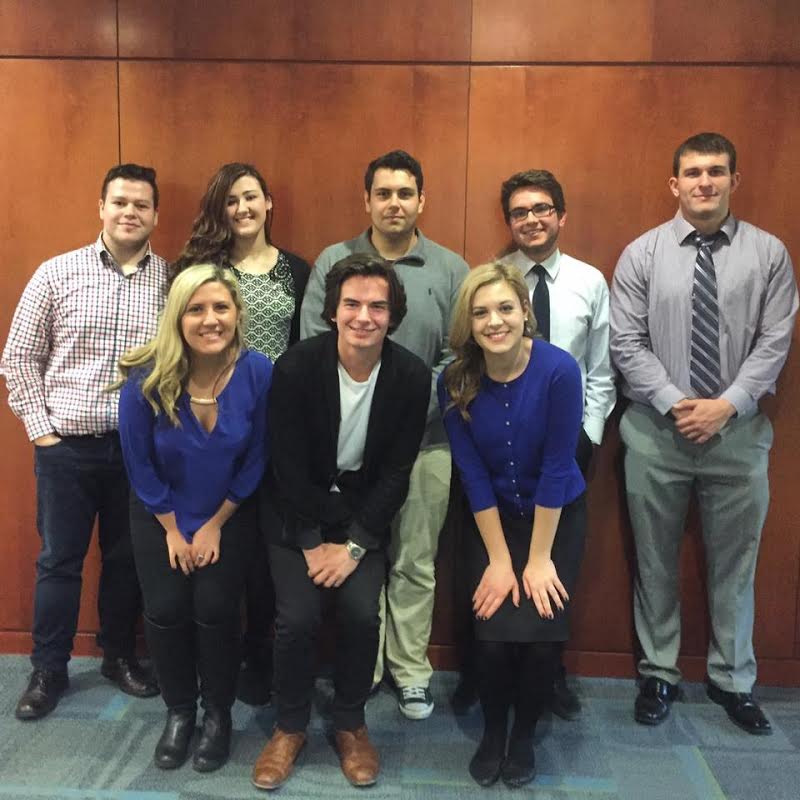Bosnian students organize at a critical threshold
Radovan Karadži? appeared relatively calm on Thursday, March 26, as United Nations Judge O-Gon Kwon handed down guilty verdicts on ten of eleven counts, including genocide, persecution, extermination and murder. Karadži?, a Bosnian Serb politician during the eighties and nineties, will spend forty years in jail for the murder of thousands of Muslims at Srebrenica in 1995.
Muhamed Talovic, a sophomore at SLU, believes justice has not been served. “I did the math, and he’s going to spend 40 hours for each victim of the Srebrenica genocide, which is nothing, really,” he said. “What I think they should have done, or what the sentence should have been, is they should have take the age of all 8,372 victims, add it together, and that’s what they should have made it.”
Talovic, born in Tuzla, Bosnia, moved with his family to Switzerland during the Bosnian War, casualties of which number in the hundreds of thousands. He was four years old when the family moved to St. Louis as part of a resettlement program for refugees. He has now lived here for 16 years.
“I lost a lot of family members [in the war],” he said: his maternal grandfather, as well as two of his father’s brothers, who were soldiers.
The Talovics, like a majority of St. Louis’ Bosnian community, initially lived in the Bevo Mill area. Karadži?’s sentencing has sparked discussion, said Talovic: “People are talking about it.
Neither side is happy about it. The victims and their families aren’t happy with it, they think it’s too little, and his supporters, they think it should have been zero. They protested back in Bosnia.”
While he might not have many memories of Bosnia, Talovic speaks fluent Bosnian, enjoys Bosnian music and says he is currently reading books to familiarize himself with Bosnia’s past. Bosnian culture continues to permeate life in St. Louis: Traditional dances have been performed during intermissions at Busch Stadium; festivals showcase food and music; Talovic said a play about Bosnian St. Louisans is being locally produced; and the Bosnia-Herzegovina soccer team practiced on SLU’s fields in November 2013. (Talovic is an avid fan.)
About 50 Bosnian students study at SLU, according to Talovic, adding that “more and more are starting to come.” They now have an organized presence on campus with the Bosnia-Herzegovina Student Association (BHSA), which the Student Government Association approved on March 16.
“It’s nice to keep in touch and make connections with people you don’t know. I know my family, but I met a couple people I had no idea existed, so that’s nice. And you get to know their stories, how they came here, what their parents went through,” said Talovic about BHSA.
He said that BHSA’s goal is to educate students on why and how their members came to St. Louis, and to share their cultural heritage with students. They hope to meet with President Pestello in the future, but in the meantime, they gather in solidarity. “We had a nice talk with the whole group. It got pretty deep and sad,” said Talovic.
Sadness, even trauma, lies at the heart of Bosnian American experience.
Last year, The University News interviewed Laura Kromják, a Hungarian Ph.D. student whose dissertation focuses on the Anglophone narrative of Bosnian genocide trauma. At that time, Kromják was a visiting fellow at the Center for International Studies.
“I feel very connected to these people,” she said, referring to the Croatian and Serbian populations of southern Hungary, although she interacted heavily with the Bosnian population in St. Louis.
While she could not immediately fulfill a request for comment on the Karadži? verdict, Kromják, who is now back in Hungary, said that she is going to Sarajevo, Bosnia’s capital, next week for a weeklong stay.
“I am interested in reactions to Karadzic’s conviction in Bosnia myself,” she wrote.
While Kromják’s research, which she presented during her time at SLU, focuses on what she called “transgenerational trauma,” she stressed a hope-fueled unity within the Bosnian community, one to which Talovic attested.
“My parents, they went through a lot … We’re all here for the same reasons, we all have that connection,” he said.
He explained that BHSA is going to Jefferson City for Bosnia Day to meet and speak with politicians.
The group will also take part in Atlas Week Events: “Diaspora and Identity: The Case of the Bosnians” and “A Look into a Bosnian American College Student’s Life” on April 6 (“Most of our members are just going to speak about how they came here, what it’s like to be here,” Talovic said of the latter), and a “Roundtable on Health Outcomes of the Bosnian Population in St. Louis” on April 7.






